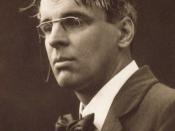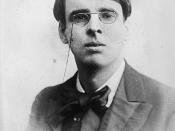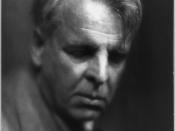ENGLISH SPEECH - W. B. Yeats
Josh: Hey John, I recently overheard your son David, talking to my son Peter, with regards to Yeats's poetry. I found his viewpoint rather misinformed. The approach he used seemed somewhat ignorant. I found that he tended to look within the poem to justify Yeats's central thematic concerns rather than evaluate the historical context associated with the period.
Theeban: Well, Ryan...good morning to you too. I find my son's approach to be a byproduct of my own views about Yeats's poetry. What were my son's exact words?
Josh: Well, firstly they were discussing the poem "Easter 1916". David said that, and I quote, "Easter 1916, at face value may seem to be an historical poem, is rather dealing with the idealistic values associated heroism". Personally, I find this argument to be specious.
Whilst this poem may be construed as an historical recount, further investigation of the construction and content of the poem reveals that this is a superficial, if not fallacious reading.
The poem reflects broader ideological and social themes, as highlighted by the Marxist perspective on Yeats. Whilst Yeats articulates the stories of 'ordinary' people, the ideals they represent are those more closely aligned with the aristocracy. For example, values of sacrifice, nobility and solitude are revealed in the rhetorical question "was it needless death after all?", to which he infers that death in rebellion can be a necessary and noble state. Thus, heroism is defined in terms of aristocratic values, revealing the way in which the class structure and the ideals of the upper class are considered to be superior to those of other classes. This is explained through a marxist critique of society in which the upper classes are able to impress upon society their own values and ideals,


